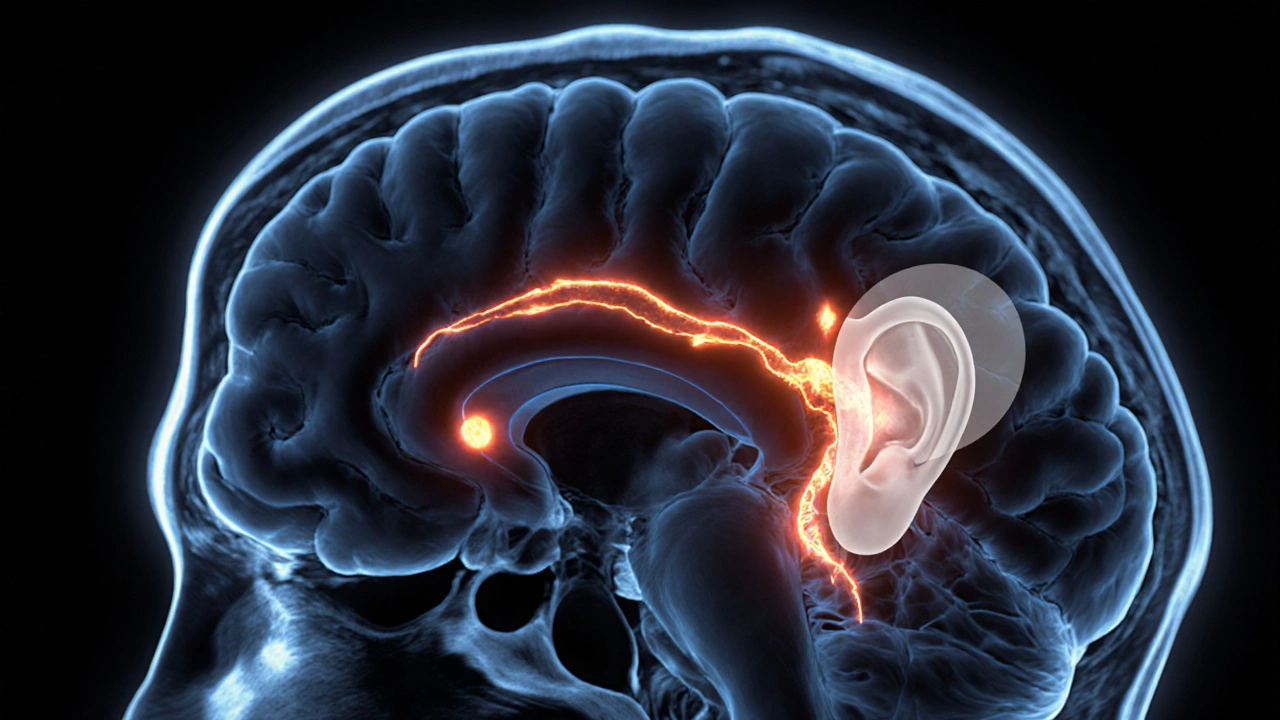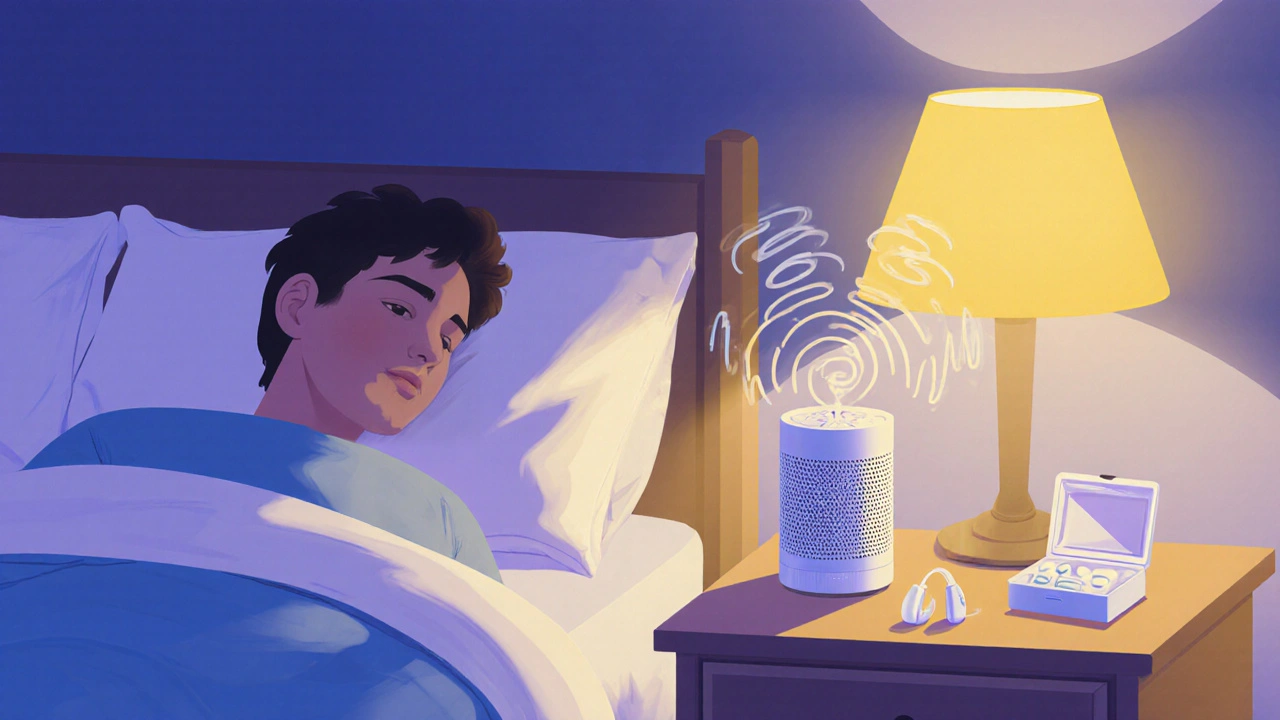MS Tinnitus Risk Assessment
Assessment Overview
This tool helps evaluate whether your tinnitus symptoms might be related to Multiple Sclerosis. Answer the following questions honestly to get personalized insights.
Risk Assessment Result
Your assessment will appear here after answering the questions.
Key Takeaways
- Tinnitus (ear ringing) occurs in up to 30% of people with multiple sclerosis.
- Lesions in the central nervous system, especially around the auditory pathway, trigger the symptom.
- MRI and detailed audiograms are essential for confirming MS‑related tinnitus.
- Management combines disease‑modifying therapies, sound therapy, and counseling.
- Seek prompt medical attention if ringing comes with new weakness, vision loss, or balance problems.
Ever notice a persistent buzz or high‑pitched whine in your ears and wonder if it’s just stress? For many, that sound is harmless. But if you’ve been diagnosed with Multiple Sclerosis, that same ringing could be a clue that the disease is active in the parts of your brain that process sound.
What is Tinnitus?
Tinnitus, commonly described as ringing, buzzing, or hissing in the ears, is a perception of sound without an external source. It can be intermittent or constant, affecting one or both ears. While most cases stem from exposure to loud noise or ear infections, neurological conditions can also create the same sensation. About 10‑15% of the general population experiences some form of tinnitus, but the underlying causes vary widely.
How Multiple Sclerosis Can Trigger Ear Ringing
Multiple Sclerosis is an autoimmune disorder where the body attacks the myelin sheath that coats nerve fibers in the Central Nervous System. This process-known as Demyelination-creates scar tissue (sclerosis) that interferes with signal transmission.
When demyelinating plaques form near the auditory pathways-such as the cochlear nerve, brainstem nuclei, or the thalamic relay centers-the brain receives distorted or incomplete signals. The auditory cortex interprets these glitches as phantom sounds, resulting in tinnitus. Research published in the Journal of Neurology (2023) found that lesions in the brainstem’s vestibulocochlear complex were present in 28% of MS patients who reported new‑onset tinnitus.

Recognizing Tinnitus as a Sign of MS Activity
If you already have an MS diagnosis, pay attention to any changes in your ear symptoms. Typical red‑flags include:
- Sudden onset of constant ringing in one ear.
- Accompanying dizziness or imbalance.
- New visual disturbances (optic neuritis) or numbness that appear around the same time.
- Worsening fatigue that doesn’t improve with rest.
These patterns suggest that a fresh lesion may be affecting the auditory circuitry, and they warrant a prompt neurological review.
How Doctors Diagnose MS‑Related Tinnitus
The diagnostic work‑up blends standard MS monitoring with specialized ear testing. The most common steps are:
- Clinical interview: Your neurologist will document the timing, pitch, and laterality of the ringing, alongside any new neurological signs.
- Magnetic Resonance Imaging (MRI): MRI scans of the brain and upper spinal cord can reveal fresh demyelinating plaques near the auditory pathways.
- Audiogram: Conducted by an Audiologist, this test measures hearing thresholds and can identify subtle high‑frequency loss often linked to neural damage.
- Evoked potentials: Auditory brainstem response (ABR) testing checks the speed of sound‑signal transmission through the brainstem, highlighting slowed conduction due to demyelination.
When MRI shows a new lesion that aligns with symptom onset, clinicians can confidently attribute the tinnitus to MS activity rather than an unrelated ear condition.
Managing Tinnitus in the Context of MS
Treatment splits into two tracks: controlling the underlying disease and soothing the ear symptom itself.
1. Disease‑Modifying Therapies (DMTs)
First‑line DMTs-such as interferon‑beta, glatiramer acetate, or newer oral agents like dimethyl fumarate-reduce the frequency of new lesions. By stabilizing the immune response, they indirectly lessen the chance of auditory‑pathway plaques forming.
2. Symptom‑Focused Strategies
- Sound therapy: White‑noise machines or low‑volume music mask the ringing, helping the brain recalibrate its perception.
- Cognitive‑behavioral therapy (CBT): Psychological counseling addresses the distress and sleep disruption that chronic tinnitus can cause.
- Medication: Low‑dose antidepressants (e.g., amitriptyline) or anticonvulsants (e.g., gabapentin) have modest success in reducing tinnitus intensity for some patients.
- Hearing aids: If an accompanying hearing loss is detected, amplifying external sounds can make the internal ringing less noticeable.
Coordination between your Neurologist and Audiologist is key to tailoring a plan that tackles both disease activity and quality of life.

When to Seek Immediate Medical Help
While tinnitus alone can be managed, certain accompanying signs demand urgent attention:
- Sudden double vision or loss of vision in one eye.
- New weakness or numbness in the limbs.
- Severe vertigo that leads to falls.
- Rapidly worsening headache or neck stiffness.
These symptoms may indicate a growing lesion or an acute MS relapse, and early intervention can prevent permanent neurological deficits.
Comparison: Tinnitus in Multiple Sclerosis vs. Other Common Causes
| Cause | Typical Onset | Associated Neurological Signs | Diagnostic Highlight | Management Focus |
|---|---|---|---|---|
| Multiple Sclerosis | Sudden or gradual during a relapse | Visual changes, limb weakness, balance issues | New demyelinating plaque near auditory pathway on MRI | DMTs + sound therapy |
| Noise‑Induced Hearing Loss | After loud exposure, often immediate | Usually no other neurological symptoms | High‑frequency hearing loss on audiogram | Hearing protection, hearing aids |
| Ototoxic Medications (e.g., aminoglycosides) | During or shortly after drug course | May include vestibular dysfunction | Medication history, cochlear dysfunction on tests | Discontinue drug, steroids if early |
| Age‑Related Hearing Decline (Presbycusis) | Gradual with aging | Often mild balance changes, no focal deficits | Broad‑range hearing loss on audiogram | Hearing aids, environmental sound enrichment |
Practical Checklist for Living with MS‑Related Tinnitus
- Log the ringing’s pitch, volume, and timing in a daily journal.
- Schedule an MRI when a new pattern emerges (usually every 6-12 months).
- Book an audiology appointment at least once a year, or sooner if symptoms shift.
- Discuss potential medication side‑effects with your neurologist-some disease‑modifying drugs can worsen tinnitus.
- Incorporate nightly sound‑masking (e.g., a fan) to improve sleep quality.
Frequently Asked Questions
Can tinnitus be the first sign of Multiple Sclerosis?
Yes, although it’s less common than visual or motor symptoms, about 1 in 4 people with MS report tinnitus as one of the earliest sensory changes. When it appears alongside subtle numbness or visual blurring, doctors often order an MRI to rule out early demyelination.
Is the ringing permanent, or can it disappear?
Tinnitus may fluctuate. During an active MS relapse, the sound can intensify, then fade as inflammation subsides. However, once the auditory pathways are scarred, a low‑level hum may remain indefinitely.
Do disease‑modifying therapies reduce tinnitus?
Indirectly, yes. By lowering the number of new lesions, DMTs lessen the chance that fresh plaques will affect the hearing system. Some patients notice a gradual dimming of the ringing after starting a stable DMT regimen.
Should I avoid certain medications because they might worsen tinnitus?
Some MS drugs (like high‑dose steroids) can temporarily heighten tinnitus. Additionally, common over‑the‑counter pain relievers containing high aspirin doses may amplify the sound. Discuss any new medication with your neurologist.
Is there a cure for tinnitus caused by MS?
There’s no outright cure, but effective management-through disease control, sound therapy, and counseling-can dramatically reduce its impact on daily life.
Living with MS means keeping an eye on any new sensations, and ear ringing is no exception. By understanding why tinnitus happens, getting the right scans, and pairing disease‑modifying drugs with targeted sound strategies, you can keep the buzz from taking over your day.

 Oct, 9 2025
Oct, 9 2025

darren coen
October 9, 2025 AT 13:08I get how unsettling that ringing can feel, especially when it might hint at something bigger.
Jennifer Boyd
October 17, 2025 AT 18:47Wow, reading through this really put a spotlight on something many of us brush off as just a nuisance!
It’s amazing how a simple buzz can actually be a signal from your nervous system calling for attention.
Remember, you’re not alone-so many in the MS community have faced this same puzzling symptom.
Thinking positively, catching it early gives you a chance to adjust treatments before anything else flares up.
It’s also a reminder that our bodies have clever ways of communicating, even if the message is a bit noisy.
Stay proactive, log those moments, and bring them up at your next appointment.
Doctors love concrete data, and a ringing ear could be the clue they need.
Keep your head up and your ears listening-for the right reasons!
Lauren DiSabato
October 26, 2025 AT 00:26It is a glaring oversight that many clinicians continue to treat tinnitus as a mere nuisance without probing its neuro‑anatomical underpinnings.
The literature, particularly the 2023 Journal of Neurology series, delineates a clear correlation between demyelinating plaques in the vestibulocochlear pathway and auditory phantom perception.
One must appreciate that the central auditory system is not an isolated conduit but an integrated hub, vulnerable to the same inflammatory assaults that afflict the optic nerve.
Consequently, a new‑onset high‑frequency ring in a patient with established MS should raise an immediate red flag.
Magnetic resonance imaging, when finely tuned to the brainstem, routinely reveals micro‑lesions that would be invisible on standard spinal scans.
Moreover, the auditory brainstem response (ABR) test provides electrophysiological corroboration, demonstrating delayed latency consistent with demyelination.
The therapeutic implications are profound: disease‑modifying agents that attenuate lesion formation indirectly mitigate tinnitus severity.
Yet, the field remains beset by a paucity of randomized controlled trials evaluating sound therapy within this specific cohort.
One cannot help but lament the reliance on anecdotal case reports that dominate conference abstracts.
In practice, a multidisciplinary approach involving neurologists, audiologists, and neuro‑psychologists is the gold standard, albeit rarely implemented.
Patients should be counseled that the tinnitus may fluctuate with relapse activity, sometimes diminishing as inflammation resolves.
Nonetheless, scar tissue can embed a persistent hum that defies complete eradication.
It is incumbent upon clinicians to differentiate between medication‑induced ototoxicity and lesion‑related auditory phenomena.
A systematic review would be a worthy endeavor, consolidating imaging findings, audiometric profiles, and therapeutic outcomes.
Until such evidence materializes, the discerning practitioner must rely on the extant pathophysiological framework to guide management.
Hutchins Harbin
November 3, 2025 AT 05:04That breakdown hits the nail on the head-especially the part about needing an ABR to nail down the timing issue.
It’s crazy how a tiny lesion can throw the whole auditory pipeline off‑balance.
Definitely worth flagging any new buzzing at the next neurology visit.
Benjamin Herod
November 11, 2025 AT 10:43The drama of a buzzing ear suddenly feeling like a harbinger of doom is all too familiar in the MS saga.
While the tone here is formal, the reality for patients is a cocktail of anxiety and hope.
We must remember that every new symptom, no matter how trivial‑seeming, could be the opening act of a relapse.
Balancing the seriousness with empathy is key, especially when the ringing disrupts sleep.
Even the most stoic neurologist should acknowledge the patient’s lived experience.
luemba leonardo brás kali
November 19, 2025 AT 16:22Indeed, a multidisciplinary approach is vital.
From a cultural standpoint, different healthcare systems may prioritize imaging differently, affecting early detection.
Ensuring clear communication between neurologists and audiologists can bridge that gap.
Corey McGhie
November 27, 2025 AT 22:01Look, I get that some folks might think ear ringing is just stress, but when you’ve got MS, it’s a whole different ballgame.
Being proactive and logging those episodes can seriously help your doc pinpoint trouble spots.
Don’t just shrug it off; treat it like any other symptom you’d report.
Sadie Bell
December 6, 2025 AT 03:40Keep pushing forward-every ring is a chance to reassess and stay ahead.
Noah Bentley
December 14, 2025 AT 09:18Honestly, the amount of jargon thrown around here is wild, but the takeaway is simple: ringing ears in MS deserve a proper work‑up, not just a shrug.
Kathryn Jabek
December 22, 2025 AT 14:57While your observation is appreciated, a more rigorous examination of the underlying pathophysiology would enhance the discourse.
In particular, the interplay between demyelination and auditory signal transduction warrants a thorough exploration.
Such scholarly depth would align the conversation with the standards of peer‑reviewed literature.
Ogah John
December 30, 2025 AT 20:36It’s amusing how we throw around “big words” while the core message is that your ears are trying to tell you something.
Maybe a little sarcasm, but seriously, pay attention to the ringing.
Kelvin Murigi
January 8, 2026 AT 02:15First and foremost, the relationship between multiple sclerosis and tinnitus is not a mere coincidence; it reflects a complex neuro‑physiological cascade that demands attention.
When demyelinating plaques encroach upon the auditory pathway, the resultant disruption in neural conductivity can manifest as phantom sounds, often experienced as a persistent ring.
Patients reporting new‑onset tinnitus should be encouraged to document the character of the sound-its pitch, volume, and laterality-as these details can guide targeted imaging.
An MRI protocol that includes high‑resolution sequences of the brainstem and cerebellopontine angle is essential for visualizing tiny lesions that might otherwise be missed on standard scans.
Beyond imaging, an auditory brainstem response (ABR) test offers quantitative data on neural conduction times, often revealing subtle delays indicative of demyelination.
It is crucial to differentiate lesion‑related tinnitus from ototoxic medication effects; many disease‑modifying therapies have side‑effects that can exacerbate auditory symptoms.
Collaboration between neurologists, otolaryngologists, and audiologists creates a comprehensive care model that addresses both the disease process and the symptomatic burden.
Sound therapy, ranging from white‑noise machines to customized tinnitus‑masking devices, can provide immediate relief while the underlying disease is managed.
Cognitive‑behavioral therapy (CBT) should also be considered, as it equips patients with coping strategies to mitigate the psychological impact of chronic ringing.
Pharmacologic options, though limited, may include low‑dose antidepressants or anticonvulsants, selected on a case‑by‑case basis after thorough evaluation of benefits versus risks.
Importantly, disease‑modifying therapies (DMTs) that reduce the frequency of new lesions indirectly lower the risk of auditory pathway involvement, thereby offering a preventative angle.
Patients are advised to maintain a symptom diary, noting any concurrent neurological changes such as visual disturbances, limb weakness, or balance issues, as these may herald a relapse.
Timely reporting of these clusters to a neurologist can prompt expedited MRI imaging and potential adjustments in DMT regimens.
Ultimately, while there is no definitive cure for tinnitus, an integrated approach that combines diligent monitoring, appropriate imaging, targeted audiologic assessment, and personalized symptom management can substantially improve quality of life for individuals navigating the dual challenges of MS and tinnitus.
ahmad matt
January 16, 2026 AT 07:54Nice rundown, but let’s not forget that not every ringing means a fresh plaque-sometimes it’s just a side effect of steroids.
kristine ayroso
January 24, 2026 AT 13:33Hey everybody, just wanted to chime in that different cultures see ear ringing in different lights-sometimes it’s called “spiritual hearing” and people might not even seek medical help right away.
But if you have MS, that’s a sign you shouldn’t ignore.
Doctors from all over should be aware of this cultural nuance.
Ben Small
February 1, 2026 AT 19:11Exactly, push the message-don’t wait for the ringing to get louder before acting.
Dylan Hilton
February 10, 2026 AT 00:50From a grammatical standpoint, the article does a solid job of using clear, concise language while still delivering the necessary technical details.
However, a few sentence structures could be streamlined for better readability.
Jennifer Pavlik
February 18, 2026 AT 06:29Great points! If anyone’s trying to keep track, jotting down when the ringing starts and any other symptoms can help the doctor figure out what’s going on.
Jacob Miller
February 26, 2026 AT 12:08Sure, that’s fine, but let’s not pretend a simple diary will solve everything-some people just ignore advice anyway.